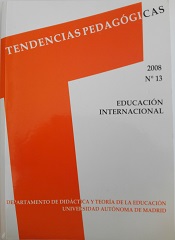Keywords:
Globalization, entrepreneur university, academic capitalism, modernism, postmodernism, epistemology, teleology, democratization.Abstract
The phenomenon of globalization, and its homogenizing and diversifying effects, are striking western university in the XXIst century. In broad terms it could be said that the main effect of globalization in nowadays western university lies in the success of the postmodern agenda in the character, teleology, epistemology and teaching and learning processes of contemporary university. This is a tendency that is highly contested by modern academics, who warn of the risks, limitations and social and moral impoverishment of promoting a professional culture in the university to the detriment of humanities. It is the humanities who have the essencial role of the design of the model of society and of men for the new century that has just started, without which society would be confined to the trends of economy as sole social guide.Downloads
References
Ball, S. J. (2006). Education Policy and Social Class. The selected works of Stephen J. Ball. London: Routledge.
Bjarnason, S. (2004). “Borderless Higher Education”, en KING, R.: The University in the Global Age. Basingstoke: Palgrave Macmillan.
BOE (16 de abril 2005). Real Decreto 426/2005, de 15 de abril, por el que se aprueban los Estatutos de la Universidad Nacional de Educación a Distancia.
Comisión Europea (2000). “E-Europe, una sociedad de la información para todos”,
Comunicación para el Consejo Europeo de Lisboa, 23 y 24 de marzo.
Comisión of The European Communities (2005). Digital Divide Forum Report: Broadband Access and Public Support in Under-Served Areas. Brussels.
Corbett, A. (2005). Universities and the Europe of Knowledge. Ideas, Institutions and Policy Entrepreneurship in European Union Higher Education Policy, 1955-2005. Hampshire: Palgrave Macmillan.
Dale, R. (2007). “Specifying Globalization Effects on National Policy”, en B. Lingard and J. Ozga, Education Policy and Politics. London: Routledge.
Dumort, A. (2002). “New media and distance education. EU and US perspectives”. In W.H. Dutton and B.D. Loader (eds), Digital Academe. The New Media and
Institutions of Higher Education and Learning. London: Routledge.
Dutton, W. H. y Loader, B. D. (eds). Digital Academe. The New Media and Institutions of Higher Education and Learning. London: Routledge.
EAQAHE (2005). Criterios y directrices para la garantía de calidad en el Espacio Europeo de Educación Superior. Bruselas.
Edwards, K. (2004). “The University in Europe and the US”, en KING, R.: The University in the Global Age. Basingstoke, Palgrave: Macmillan.
Evans, T. and Nation, D. (eds) (1996). Opening Education. Policies and Practices from Open and Distance Education. London: Routledge.
Fallows, S. y Steven, C. (eds) (2000). Integrating key skills in higher education. Employability, transferable skills and learning for life. London: Kogan Page.
Fernández, J. M. (1999). Manual de política y legislación educativas. Madrid: Editorial Síntesis.
Field, J. (2000). Lifelong learning and the new educational order. Stoke on Trent, Trentham Books.
Filmer, P. (1997). “Disinterestedness and the Modern University”, en A. SMITH and F. Webster (eds), The Postmodern University? Contested Visions of Higher
Education in Society. London: Open University and SRHE.
García Garrido, J. L. y García Ruiz, M. J. (2005). Temas candentes de la educación en el siglo XXI. Madrid: Ediasa.
García Ruiz, M. J. y Gavari Starkie, E. (2007). “Guiding principles of the Digital Academe: some thoughts about the European Virtual Higher Education Space”,
Open Education, 5.
INE (2000). Estadística de la Enseñanza Superior en España. Series de todos los niveles. Curso 1997/1998. Madrid.
Jacob, M. y Hellström, T. (eds) (2000). The Future of Knowledge Production in the Academy. Buckingham: Open University and SRHE.
Ker, I. (1999). “Newman´s Idea of a University. A Guide for the Contemporary University?, in SMITH, D. y LANGSLOW, A. K. (eds). The Idea of a University. London: Jessica Kingsley Publishers.
King, R. (2004a). The University in the Global Age. Basingstoke, Palgrave: Macmillan.
King, R. (2004b). “Globalization and the University”, en R. King (2004), The University in the Global Age. Basingstoke, Palgrave: Macmillan.
Kogan, M. y Hanney, S. (2000). Reforming higher education. London: Jessica Kingsley Publishers.
Lingard, B. y Ozga, J. (2007). Education Policy and Politics. London: Routledge.
Marginson, S. (2007). “National and global competition in higher education”, en B. Lingard and J. Ozga, Education Policy and Politics. London: Routledge.
Puelles Benítez, M. de (1993). “Estado y Educación en las Sociedades Europeas”, Revista Iberoamericana de Educación, 1.
Readings, B. (1996). The University in Ruins. Cambridge: Harvard University Press.
Scott, P. (1997). “The Postmodern University?”, en A. Smith, y F. Webster (eds), The Postmodern University? Contested Visions of Higher Education in Society.
London: Open University and SRHE.
Smith, A. y Webster, F. (eds) (1997). The Postmodern University? Contested Visions of Higher Education in Society. London: Open University and SRHE.
Soacha Ortega, J. H. (2001). “Origen de la educación personalizada”, Sappiens.
UE (2001). Comunicación de la Comisión de 21 de noviembre de 2001 – Hacer realidad un espacio europeo del aprendizaje permanente [COM (2001) 678 final].
UNED (2001). Informe final de evaluación de la titulación de Geografía e Historia. Plan Nacional de Evaluación de la Calidad de las Universidades. Madrid.
